The 2019 IECG Corporate Governance Conference began with an inspirational message about leadership from former Hewlett-Packard CEO and 2016 presidential candidate Carly Fiorina. Attendees also were treated to an extended metaphor equating corporate bylaws to the U.S. Constitution.
Although the threat of severe weather abruptly ended the event when the UT Dallas campus closed, the last headline speaker, Federal Reserve Board nominee Stephen Moore, subsequently recorded an interview that organizers planned to make available to those who attended.
Fiorina’s keynote address, “Unlocking Potential by Building Today’s Corporate Leaders,” centered on the difficult path of leadership, which she described as the ability to solve problems that can change an organization for the better.
Presented by the Institute for Excellence in Corporate Governance at the Naveen Jindal School of Management, the conference was held April 17 at the Davidson-Gundy Alumni Center. The audience of about 250 consisted primarily of C-suite officers, directors, general counsels and risk management, compliance and governance officers.
Dennis McCuistion, executive director of the institute, emceed the conference and opened festivities by introducing Anthony J. LeVecchio, president and owner of The James Group Inc., IECG board member and an accounting lecturer at JSOM. LeVecchio, in turn, introduced Fiorina.
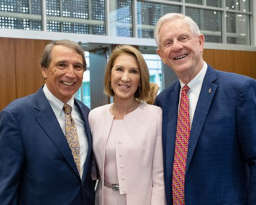
She currently heads Carly Fiorina Enterprises, an executive coaching firm that provides leadership training, problem solving and diversity training for business and advisory boards. She also leads Unlocking Potential Foundation, an organization that provides the same training to nonprofit organizations.
Fiorina’s speech began with a summary of her career trajectory, from starting as a “Kelly Girl” — an old term that used to describe a secretarial temporary worker, usually female, who worked for Kelly Services or other employment agencies — to blossoming as a leader and eventually becoming a pioneering female CEO. She framed her discussion by characterizing the differences between managers and leaders.
“Managers don’t change the status quo; they do the best they can within it. … There’s nothing wrong with that, but it’s not leadership,” she said. “Leaders change constraints and conditions.”
That difference, Fiorina said, explains why problems can fester in many corporate cultures. Leadership from “change warriors,” as she termed problem-solving leaders, necessitates the quality of courage because it inevitably meets opposition from the “resisters” who try to maintain the status quo at all costs.
The battle is won, Fiorina explained, by whichever side can recruit a critical mass of the majority within an organization whom she described as the “skeptics,” those who are aware that change is needed but are uncertain that it can succeed.
Character is another essential quality for leadership, Fiorina said, because it requires “integrity over time” and “honor over time,” as well as the aforementioned courage, which also should be displayed over time, she said.
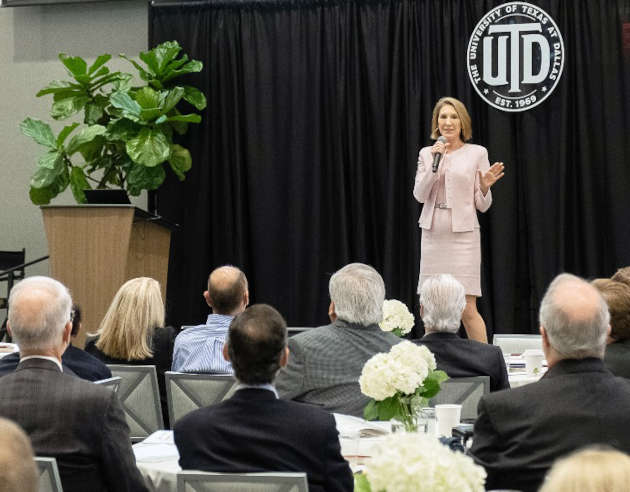
“The humility to understand that nothing gets solved by somebody acting by themselves” is also critical to leadership,” Fiorina said, as is “the humility that understands none of us alone possess everything we need to make progress,” without which there is no impetus to collaborate with others.
Finally, leadership requires empathy, which is, Fiorina said, “seeing the value that someone else can bring to a situation and seeing beyond what they look like,” — the reason being that “most problems get solved quicker and better when you have a diverse group of people who look at them.”
Fiorina, delivered her address as the Max Hopper Speaker at the conference. The late Hopper (1934-2010), the longtime CIO of AMR, the parent company of American Airlines, led the team that developed the groundbreaking Semi-Automated Business Research Environment that became the digital airline reservation system Sabre. He also served for a time as chairman of the Jindal School’s advisory council.
Next up was a trio of C-suite executives. Mike Engler, chairman and CEO of Cactus Feeders; Cindy Lewis, president and CEO of AirBorn Inc.; and Whit Perryman, CEO of Vermeer Texas-Louisiana; who discussed the intricacies of succession planning for the boardroom. The morning session ended with Greg Brenneman, executive chairman of CCMP Capital, discussing what boards today need to know about private equity.
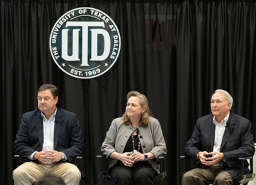
Dr. Hasan Pirkul, Caruth Chair and dean of the Jindal School, opened the afternoon session by welcoming the audience. Ken Jacobson, communications director of the AIRnet, was the first afternoon speaker, with a talk titled “Share Buybacks…Good Idea or Not.”
McCuistion then took his turn at the lectern. Against the backdrop of a conference that shares best practices in corporate governance, he framed his presentation,“Can Good Governance Save Americans from Washington D.C.?” by comparing the U.S. Constitution to corporate bylaws and likening American citizens to shareholders.
“I don’t think that the Constitution needs to be rewritten, like some people do,” he said. “I think it needs to be read and reread and — more importantly — adhered to.”
McCuistion then elucidated the pitfalls that come from not reining in the U.S. national debt, which currently stands at more than $22 trillion, the implication being that a massive debt is akin to bad corporate governance.
“Our federal government is insolvent by a huge amount,” he said. “The Federal Reserve has no capital at all. And we continue to play this game as if there were money in Washington, D.C. Folks, there ain’t no money. I hate to say it, I hate that it’s that way because what we’ve done to future generations, frankly, is troubling.”
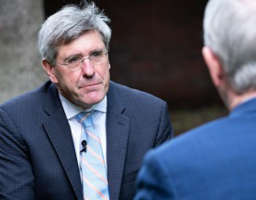
Stephen Moore, the Distinguished Visiting Fellow for the Project for Economic Growth at the Heritage Foundation’s Institute for Economic Freedom and Opportunity, was slated to be the final speaker of the day. However, before Moore arrived, UT Dallas President Richard C. Benson ordered the campus closed due to the threat of severe weather.
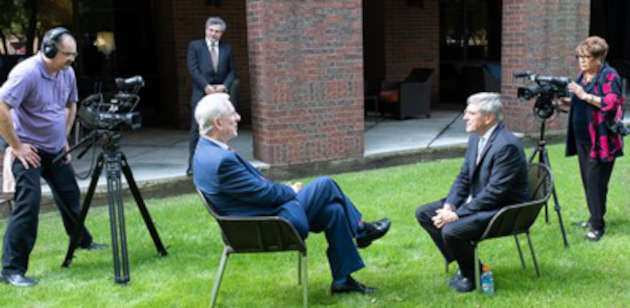
McCuistion quickly gathered a film crew and arranged to meet Moore, who is an advisor to President Donald Trump and a nominee for a vacancy on the Federal Reserve Board of Governors, at an off-campus location for an impromptu filming of the planned presentation.
“People always ask me, ‘what is Trumponomics?’ ” Moore said in a recorded interview with McCuistion that organizers said they plan to show event attendees in the near future. “It’s putting American businesses first, putting American workers first and emphasizing growth.”
Moore stated that he thinks every decision Donald Trump makes, with few exceptions, is based on the idea: “Is this going to grow the economy faster? Is it going to increase wages? Remember, Donald Trump won this election because he won the blue-collar vote of working-class Americans — manufacturing and construction and hard-hat workers, and he thinks every day about how these decisions are going to affect those people.”





